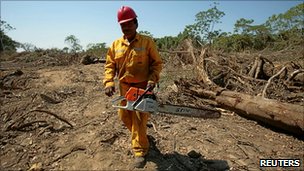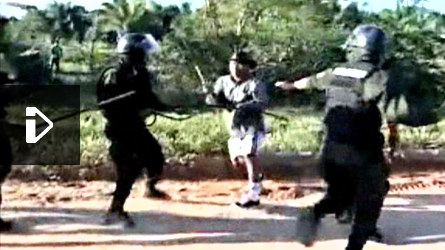Bolivian police break up Amazon road protest march
September 26, 2011 - BBC
Witnesses said about 500 police surrounded the protesters
Bolivian police have broken up a long-distance march by indigenous protesters who oppose plans to build a road through a rainforest reserve.
Officers wielding truncheons and firing tear gas moved in on the demonstrators' camp, taking people away in buses.
President Evo Morales says the road is vital for development but has offered to hold a referendum on the issue.
Hundreds of people set off last month to march to La Paz but were stopped at Yucomo, with 250km (155 miles) to go.
An estimated 500 police officers moved in late on Sunday afternoon on a camp set up by the marchers.
Protest leaders said dozens of people had been driven away and their whereabouts were unknown.
Local police chief Oscar Munoz said the people were being taken back to their hometowns.
The Bolivian ombudsman, Rolando Villena, criticised what he said was excessive use of force by the police.
"Injured children, disappeared mothers who didn't want to separate from their children - this does not talk well about our democracy. This is not democracy," he said.
Deforestation
The clashes came a day after protesters had briefly held the foreign minister, David Choquehuanca, forcing him to walk with them.
Mr Choquehuanca, who had come to negotiate with the protesters, said the fact that he was freed showed "they want to resolve matters through dialogue".
 (right) The road is already under construction
(right) The road is already under construction
In an apparent bid to defuse tension, President Morales said on Sunday that he would put the road plan to a regional referendum.
"If they say yes, a study will be done to see where the best route for that road is, the most direct...and with the least environmental impact," Mr Morales said.
Plans for a road through the Isiboro-Secure Indigenous Territory and National Park - known by its Spanish acronym Tipnis - have divided opinion in Bolivia.
Indigenous people who live in the reserve say the highway would encourage illegal settlement and deforestation in their ancestral Amazon homeland.
Hundreds of protesters set off in mid-August to walk 500km from Trinidad to Bolivia's main city, La Paz, to voice their opposition.
But others, including Mr Morales, say the road would help bring basic services to isolated communities, and also boost the local economy by giving farmers better access to markets.
The road, which would link the highland city of Cochabamba with San Ignacio de Moxos in the Amazon lowlands, is being funded by Brazil and built by a Brazilian company.
The march, which set is the latest in a series of challenges Mr Morales is facing from indigenous groups and social movements that helped make him Bolivia's first indigenous president.
